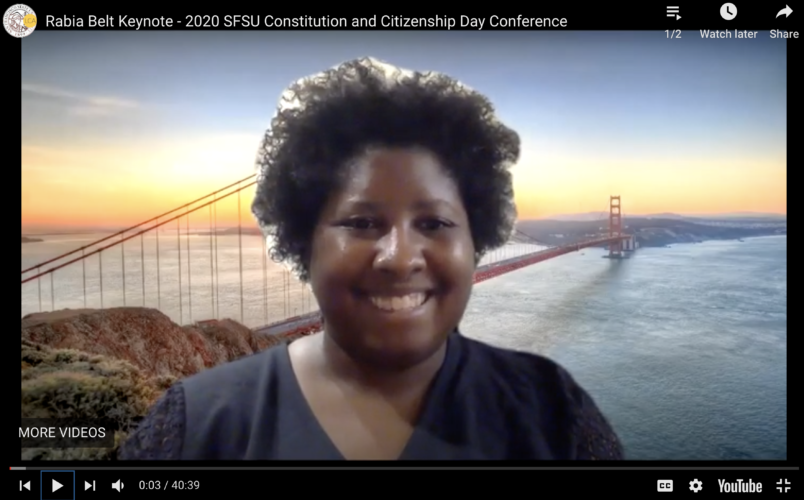Constitution Day 2020: Celebrating the Right to Vote
September 17, 1787, may not be a date emblazoned on the minds of all Americans, like July 4, but the significance of the date that our founding fathers signed the most influential document in American history, the U.S. Constitution, also deserves recognition and reverence.
In 2004, Senator Robert C. Byrd of West Virginia included key provisions in the Consolidated Appropriations Act of Fiscal Year 2005 designating September 17 of each year as Constitution Day. All educational institutions that receive federal funds are required to hold a Constitution Day educational program each year on or near September 17th. This year, the Stanford Constitutional Law Center (Con Law Center) at Stanford Law School (SLS) hosted a virtual Constitution Day event featuring an address by the Honorable M. Margaret McKeown followed by a conversation and Q&A with Professor Michael McConnell, the Richard and Frances Mallery Professor and director of the Con Law Center.
In addition, Stanford Law Associate Professor Rabia Belt was the keynote speaker at San Francisco State University (SFSU) for their virtual Constitution Day event. Both McKeown and Belt focused their addresses on the 100-year anniversary of the 19th Amendment and how it changed the constitution and history.
Honorable M. Margaret McKeown
“As great as the constitution was for creating a strong nation, it was written by, for and from the perspective of men,” said McKeown during her 45-minute Constitution Day remarks focused on the anniversary of the 19th amendment. McKeown walked listeners through the winding path of six amendments that broadened the constitution to address the right to vote in her remarks titled “My Mother Made Me Do It: How Motherly Advice Secured Ratification of the 19th Amendment and Changed the Course of History.”
About M. Margaret McKeown
McKeown is a judge on the U.S. Court of Appeals for the Ninth Circuit. She attended the University of Madrid and graduated Phi Beta Kappa from the University of Wyoming with a B.A. in 1972 and from Georgetown University Law Center with a J.D. in 1975. She received an honorary doctorate from Georgetown University in 2005. McKeown was a White House Fellow in 1980-1981, serving as Special Assistant to the Secretary of the Interior and Special Assistant at the White House. In 1993, she served as a Japan Society Leadership Fellow. She was the first woman partner at Perkins Coie.
McKeown is chair of the ABA Commission on the 19th Amendment and the Ninth Circuit Pacific Islands Committee. She serves on the Chief Justice’s Workplace Environment Working Group and chaired the federal Codes of Conduct Committee. She is a member of the American Academy of Arts and Sciences and a member of the Council of the American Law Institute. She is the author of a forthcoming book, Citizen Justice: The Environmental Legacy of William O. Douglas.
Professor Rabia Belt
Belt addressed the intersection of disability and race in the campaign for women’s suffrage during her Constitution Day address at SFSU.

About Rabia Belt
Belt is a legal historian whose scholarship focuses on disability and citizenship. Her scholarship ranges from cultural analysis of disability in media, to contemporary issues facing voters with disability, to the historical treatment of disabled Americans. She is currently writing a book titled, “Disabling Democracy in America: Disability, Citizenship, Suffrage, and the Law, 1819-1920.” In 2015, the American Society of Legal History named her a Kathryn T. Preyer Scholar for her paper, “Ballots for Bullets? The Disenfranchisement of Civil War Veterans.”
Belt is also an advocate for people with disabilities. In 2016, President Obama named her as a Councilmember to the National Council on Disability, the independent federal agency that advises the president, congress, and other federal agencies regarding policies and practices that affect people with disabilities. Additionally, she serves as a member of the Board of Directors for the Disability Rights Bar Association.
About the Stanford Constitutional Law Center
The Stanford Constitutional Law Center focuses particularly on the separation and scope of legislative, executive, and judicial powers; the structure of constitutional democracy; the freedoms of speech, press, and religion; and the right of privacy, including the privacy of personal data in a digital world. Founded in 2006 by former Dean Kathleen Sullivan, the Constitutional Law Center is currently led by Faculty Director Michael W. McConnell, Richard and Frances Mallery Professor of Law.
About Stanford Law School
Stanford Law School is one of the nation’s leading institutions for legal scholarship and education. Its alumni are among the most influential decision makers in law, politics, business, and high technology. Faculty members argue before the Supreme Court, testify before Congress, produce outstanding legal scholarship and empirical analysis, and contribute regularly to the nation’s press as legal and policy experts. Stanford Law School has established a model for legal education that provides rigorous interdisciplinary training, hands-on experience, global perspective, and focus on public service, spearheading a movement for change.

